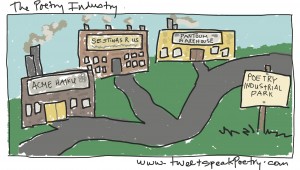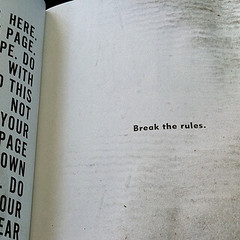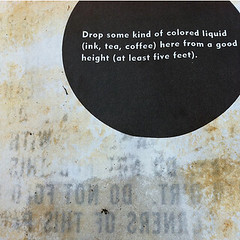The best in poetry (and poetic things), this week with Will Willingham
1 Art
I have a small, odd-shaped piece of wood on my desk and a stash of sandpaper in various grades behind my paper shredder. Sometimes, when I need to prospire a little and don’t have time for an Artist Date, I put sandpaper to wood scrap and smooth some edges. When I see the work artist Tom Eckert does with wood sculptures, my meager efforts to transform a chunk of wood that looks like a cross between a rabbit and a frog into a stack of books and a bottle of household cleaner seem to fall short. Eckert does some remarkable work with wood and lacquer paint that will have you wondering if it’s really made of wood, in particular his creation of the appearance of cloth. (This Is Colossal)
Maybe the scent of fresh sawdust and the feel of wood grain under your fingertips doesn’t do anything for you. Maybe it’s stars that put a twinkle in your creative bursts. You might appreciate photographer Thierry Cohen’s series, Darkened Cities. Cohen displays cityscapes with stunning skies above, full of stars you never knew were there. To produce the images, Cohen traveled to locations on the same latitude as the city to photograph the night sky without all the light and air pollution that prevents a person from seeing the star over a city. In effect, you’ll see the stars you could never see over Manhattan even in a hot air balloon, but they are there just above the noise.
I had a brief moment looking at both these artists’ work when I imagined that my trying to learn a little something from them might look like this amusing piece from Kid History. You know, the folks who act out the stories their kids tell and make trolling Facebook worthwhile. (Kid History)
2 News
 Surely you saw the recent scuttlebutt in the local Poetry Industrial Park about the challenges facing The Poetry Industry’s profitability. As though to add insult to injury, last week Salt Publishing announced it would no longer publish single-author collections, and would focus its publishing efforts on poetry anthologies. The publisher cites the significant slump in sales of individual collections particularly with the loss of brick and mortar bookstores. It’s recognized that many poets found Salt receptive to their debut collections and the publisher effectively launched many the career of a notable poet. Their work in this segment of The Poetry Industry will be missed. (Tweetspeak, The Guardian)
Surely you saw the recent scuttlebutt in the local Poetry Industrial Park about the challenges facing The Poetry Industry’s profitability. As though to add insult to injury, last week Salt Publishing announced it would no longer publish single-author collections, and would focus its publishing efforts on poetry anthologies. The publisher cites the significant slump in sales of individual collections particularly with the loss of brick and mortar bookstores. It’s recognized that many poets found Salt receptive to their debut collections and the publisher effectively launched many the career of a notable poet. Their work in this segment of The Poetry Industry will be missed. (Tweetspeak, The Guardian)
Meanwhile, Tasha Golden takes a pointed (and hilarious) look at why it might be that The Poetry Industry has a hard time finding its public (or shall we say, capturing its market), by comparing it to The Pop Music Industry.
In Poetry Land there’s a myth that art is tainted by popularity: the more eyes see it, the more corrupt it becomes. Said myth is outdated and nonsensical, but survives because it’s a nice stunt double for artistic integrity. It’s also great for cognitive dissonance: if no one’s reading poetry, it helps to think we never wanted them to. AND it justifies our laziness in connecting with non-poets. Hooray!
She might poke a few of our open wounds with this one, but she might also be on to something. (Ploughshares)
And to those who are discouraged by the economics of a Poetry Industry in search of a public, Robert Peake offers some timely encouragement in the form of “An Open Letter to Dispossessed Poets.”
The audience is dwindling. Fine. If you need someone to write for, write for me. I mean it. I need your poems as much as I ever did–the ones I can carry around with me, the blue flame, the chip of ice in my heart. Want to build a larger audience for poetry? Live your life with such pure ferocity and rollicking panache that people beg you to tell them your secret. Then slip them your favourite book of poems.
Can we really pretend to be surprised that a world so laden with paradox and ugliness, drone wars and misery, ignores this refined art form? But precisely because of this, I need your best poems more than ever before. And you need them too. Someone gave you the power to see the world differently, and–even better–to share it. (Huffington Post Culture)
Come on, Poet. The world needs your poems.
And, you can keep Acme Haiku and Sestinas R Us from closing their doors.
3 Places
There’s nothing like hiding poems in plain sight to bring them to your waiting public. (See? You had one all along.) Thanks to a project spearheaded by Amy Bagwell, visitors to Uptown Charlotte, NC, are greeted by an enormous representation of A. R. Ammons’ “Salute.” The mural is the first installment in The Wall Poems of Charlotte. The project aims to bring poetry to the people with gallery-type presentation vs. poetry reading, which is in keeping with Bagwell’s art, combining poetry and sculpture. If you’re in the Charlotte area, be sure to swing through Uptown and stare at the wall above the Dandelion Market for a while. It’s not the same as loitering if you’re reading a poem. (Charlotte Observer, The Wall Poems of Charlotte)
4 Poetry at Work
Back in our good friend William Shakespeare’s day, there wasn’t such a fuss about the state of The Poetry Industry. At least not for Shakespeare. According to Dr. Bart van Es, a researcher at Oxford, Shakespeare was a shareholder in the local theatre which not only gave him insider influence, but also a good return on investment. That the poet and playwright took on the role of entrepreneur gave him the freedom to innovate, something many of his contemporaries did not have. Interesting that playing the businessman part may have been what allowed him to cultivate his unique voice. (BBC News)
But most poets and authors couldn’t invest in a piece of the theatre, so have long had (and and still have) day jobs. We’ve highlighted them here before, but now Grant Snider has put out a fun and informative strip featuring Day Jobs of the Poets. (Incidental Comics)
And speaking of Poetry at Work, we’re launching the first ever Take Your Poet to Work Day on July 17. It’s not too soon to start thinking about what poet you’ll tuck into your back pocket or lunchbox. Watch Tweetspeak over the next several weeks as we release our poet collections for you to choose from.
5 Creativity
Have you played yet today? Researcher Linda Stone writes on the way play helps to form effective attention strategies and ward off the effects of “continuous partial attention…the modern predicament of being constantly attuned to everything without fully concentrating on anything.” She suggests that different contexts require different activity strategies, and that play aids in the development of our “capacity for attention and for a type of curiosity and experimentation.” (The Atlantic)
When my plans for world domination (or at least domination of The Poetry Industry) come to fruition, I plan to require playtime every day from about 10 until noon. Then we can break for lunch. And when we’re all tuckered out from playing, we can read and write because both reading and writing have a profound impact on the brain — I don’t mean the natural acquisition of knowledge that takes place when we read, but the effect of these activities on memory and stimulus of specific brain processes that occur. And finally, someone wrote it down in gray and white that we retain information better in story form than in bulleted lists. Which is why, of course, this data is presented via an infographic rather than a PowerPoint presentation. (Visual News)
While we’re on the subject of world domination, let me remind you that IBM’s recent global study of 1500 CEO’s found that “that the most important skill for successfully navigating our increasingly complex, volatile, and uncertain world is none other than creativity.” Yes. The rest of the world’s industries need The Poetry Industry. And maybe our How to Think Like a Creative Genius workshops (not to mention, in art graduates too!) Business leaders are finding what they need most in their workers — “creativity, resiliency, flexibility, high tolerance for risk and ambiguity, as well as the courage to fail” — in art graduates. Shakespeare was on to something with his business activities. (Fast Company)
6 Write-It
So you’re working in earnest to keep The Poetry Industry (and the rest of the literary industry) afloat by producing high quality work and submitting it to every literary journal within email-shot. But how much do you really understand about what’s going on behind the doors of the Poetry Factory? Do you know how the editors stand behind the conveyor belts while one submission after another rolls along, and how, like Lucy and Ethel making pastries, sometimes it just turns into a lot of berries and whipped cream in their hairnets? You might want to read this piece to walk you through the submission process, clarifying the editor’s job and the writer’s job in the submission process. It’s long, but has some great tips for how to handle rejection, and how to have a strategy for and keep track of your submissions. I particularly appreciated this tip for doing your homework (and don’t give me that “I don’t have to do homework; I’m expanding my attention capacity by playing” business):
A good tip: go in together with four other people and each subscribe to a couple of journals, and then share them. So cheap! Then you can discuss the work that was chosen, which can be a great amplification of your usual workshopping. What do these pieces have (or not have) compared to the work you and your friends are writing? How unified, inventive, and polished does a story have to be to be published? Which editors like what? (The Review Review)
7 Poems
What do you do when you read that one poem that leaves you with simply nothing else to say? You could write it in your poetry notebook because writing out the words makes them more real. Or you could print it and put it in a drawer. Or you could put a bookmark on that page. Or write something in the margin. Or send it to a friend to read. Or just set it down and walk quietly away.
Take your pick. Or do them all. With either of these.
Give Me Your Wife
because
I like her. I like
the signs of wear on her;
the way her breasts have dropped a little with the years;
the weathered evidence of joy around her eyes.
Read the rest of Give Me Your Wife by Tony Hoagland at The Lascaux Review
The Juggler Tells His Children of Dreams
when juggling eggs
let the hands be a clock
circling with the softness of patience
Read the rest of The Juggler Tells His Children of Dreams by Robert S. King at Every Day Poems
8 People
Here’s the thing. This is why the world domination plans of haiku masters are far more likely to succeed than novelists. A haiku poet, to the best of my knowledge, never had to keep notebooks and charts and papers taped up on his bedroom wall in order to keep track of things. Somewhere around 17 syllables, a kireji, a nature reference, and you’re good to go. The poem and the flowchart could fit together on a Post-It note. But try to keep that novel you’re working on in your head? Not going to happen. We ran across a fun collection of the working outlines of famous novels from Catch-22 to The Bell Jar. Don’t worry. If you get lost, follow the red arrow to the next chapter and you’ll eventually find your way out. (Flavorwire)
9 Books
Last week, one of my sons delivered the commencement address at his high school graduation. In his brief reflection he said, “My class taught me to take pride in whatever we do, and do it well. The phrase ‘I’ll be me and you be you’ … means it didn’t matter what the next guy was doing; we just did whatever it was that we did best and excelled at it.”
I’d thought earlier of referring him to one of many famous commencement addresses on YouTube for inspiration. But when I heard the speech I wondered if he’d been reading Uncommon Genius: How Great Ideas are Born by Denise Shekerjian, recently featured at Brain Pickings:
The trick to creativity, if there is a single useful thing to say about it, is to identify your own peculiar talent and then to settle down to work with it for a good long time. Everyone has an aptitude for something. The trick is to recognize it, to honor it, to work with it. This is where creativity starts. (BrainPickings)
To the Class of 2013: A word of congratulations from The Poetry Industry. And a small reminder that perhaps “You be you” means read or write some poetry.
10 Sound n Motion
Familiar with shape-note singing? I’m not. I’m from the wrong part of the country. Take a listen to this clip of Sam Amidon featuring the centuries-old part music, part New England social tradition. (NPR)
Cover photo by Scloopy. Creative Commons via Flickr. Article photos by Claire Haidar. Used with permission. Post by Will Willingham.
- Earth Song Poem Featured on The Slowdown!—Birds in Home Depot - February 7, 2023
- The Rapping in the Attic—Happy Holidays Fun Video! - December 21, 2022
- Video: Earth Song: A Nature Poems Experience—Enchanting! - December 6, 2022










Seth Haines says
I LOVE THE SOUND N MOTIO VIDEO!!!
Maureen Doallas says
Salt’s just prospiring. Look at this way: Is it better to publish a lot of a few poets or a little of many poets? The secret’s in spreading the words around.
Will Willingham says
Love that perspective, Maureen. Prospiring.
It would be more disheartening to me I suppose if they were pulling up stakes altogether and going into, say, the inflatables business instead.
But they’re still publishing poetry, and with a model that works.
Maureen Doallas says
The Poetry Kit site is also, I think, a response to the “woe is poetry” line. As a Guardian article noted this morning, the “industry” is just adapting to “a new publishing age”. It cites an anthology for Pussy Riot that won an indie poetry award, the Saboteur (love the name).
http://www.poetrykit.org/
Will Willingham says
Darn. Wish that Guardian article had run yesterday. Would have been a great addition to the discussion. Glad you pointed it out here.
It’s here, if anyone is intereted: http://www.guardian.co.uk/books/booksblog/2013/may/30/poetry-new-territory-sales-salt-publishing
The opportunities are certainly there for those who choose to look at things in a different way than they have before.
L. L. Barkat says
Is a hot-air balloon over starry Manhattan a perk of The Poetry Industry? Because if it is, I’m in 🙂
Loved the poetry industry riff in this Top 10. Smiles. 🙂
Will Willingham says
In the balloon? You mean it’s there already?
😉
Maureen Doallas says
She’s re-imagined the pink limo. Up up and away!
Megan Willome says
I used to attend a Bible study in a Church of Christ church, and their hymnals had shapes for the notes, since, you know, no instruments. That was the first time I’d seen it.